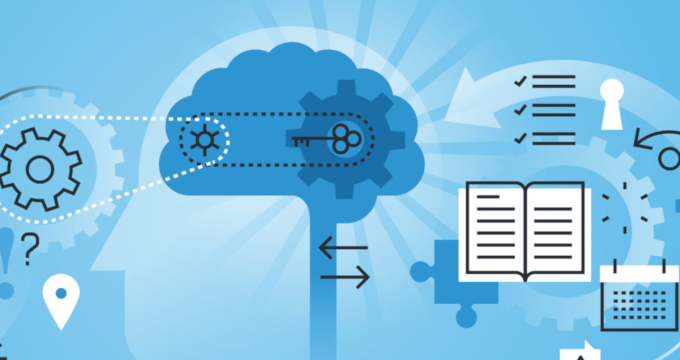Assessment is an integral part of teaching and learning. It’s also one of the education domains that embrace the adoption of artificial intelligence. Through analyzing a variety of metrics on students’ attendance and learning patterns, AI is helping educators maximize learning outcomes. In this article, we will talk about how artificial intelligence is transforming knowledge assessment practices.
The concept of using algorithms for knowledge assessment is not entirely new: in fact, it’s been around since the 1990s when classroom computers became omnipresent. Back then, paper-based versions of tests moved to computer screens and educators started using automated scoring and computer-generated interpretive reports for learning assessment.
Today, AI-based knowledge assessment leverages technologies like robotic process automation (RPA), machine learning, pattern matching, and natural language processing (NLP). The combination of these technologies helps educators to analyze vast amounts of data and make changes in personalized learning plans.
AI Assessment in K-12 Education
Via diagnostic testing, AI identifies the students’ learning gaps and suggests changes in individual learning curricula. A lot of Edtech vendors coach their AI algorithms according to the Knowledge Space Theory (KST). This approach defines and tracks student’s “knowledge points” in mathematical language and forms a picture of a person’s “knowledge state” for a particular subject.
AI grading and scoring systems are now generating unique multiple-choice test questions “on the fly” and leverage adaptive scoring – automatically adjusting the level of difficulty to the persons’ knowledge level. Adaptive testing systems are capable of evaluating both verbal and quantitative answers and base their next questions on a person’s previous responses. The system thus offers each test taker an individual set of questions covering the same subject or knowledge area.
AI assessment is widely used in modern learning management systems. For example, VARTEQ’s ReaLMS has an in-built knowledge assessment module for conducting tests, assessing and grading the student’s skills and knowledge without required physical presence.
AI Assessment in the Corporate Sector
With companies increasingly offering possibilities for continuous upskilling and training, correct assessments of skills and talent are of critical importance. Apart from the constantly evolving set of hard skills, organizations are leveraging AI potential to assess the candidate’s psychometric portrait. For this purpose, companies may use conversational chatbots for situational judgment tests (SJT) – the tests that measure how any particular person is likely to respond in various work situations and evaluate their interpersonal and technological prowess as well as emotional stability. On top of that, AI uses natural language recognition and emotion-tracking software to analyze video interviews.
Organizations are also using AI for recruitment and talent assessment. Using algorithms and machine learning, AI-based assessment helps businesses find candidates with the necessary level of hard skills and identify people with personality traits that would help propel organizations’ goals and positively impact their development. This helps companies improve their talent strategies and focus on growing and retaining the best talent.
Read also: How Learning Analytics Transform Education Outcomes
Benefits of AI in Knowledge Assessment
AI goes a long way to help educators and businesses implement efficient knowledge and personnel assessment practices. The main advantages of AI assessment are as follows:
Precision
AI algorithms are capable of analyzing far more data than humans. Moreover, these algorithms are able to self-learn, enhance their analytic capabilities, and deliver even more precise evaluation results.
Efficiency
AI can carry out a number of assessments simultaneously and come up with evaluation results faster than humans. On top of that, AI detects repetitive behavioral and learning patterns earlier than humans and helps educators adjust learning courses to reach better outcomes.
Reducing bias
It’s no secret that humans are prone to bias which often impacts their evaluations and assessments. Algorithmic evaluations are more impartial and help reduce bias. However, it has been proven that algorithms can mimic the bias of their creators, so it’s crucial that at least several assessors take part in programming AI assessment systems.
Challenges in AI Assessment
If you plan to implement AI assessment, there are at least three challenges that you will have to address:
1. Legal defensibility
To avoid litigations, you must be able to explain why you have arrived at a certain decision while carrying out student or personnel assessment. If your algorithm is too complex and you can’t explain how it works, it may be difficult to defend your decision. The best assessment algorithms are custom-made, mimic the practices of human assessors, and are simple enough so that their logic is understandable.
2. Time-to-value
Programming an algorithm for your specific assessment needs takes time. It may take up to six months to feed all the information into the system and to train it to carry out assessments.
3. Data security
Student or employee data may be misinterpreted and even deliberately abused, if handled incorrectly. Hence, data security is paramount when it comes to AI-based knowledge assessment. Make sure the systems you use for AI assessment ensure top-notch data protection.
At VARTEQ we build advanced skills measurement solutions for businesses using the best AI assessment practices. Looking to develop a knowledge assessment system tailored to your specific needs? Contact us now for a free consultation!

